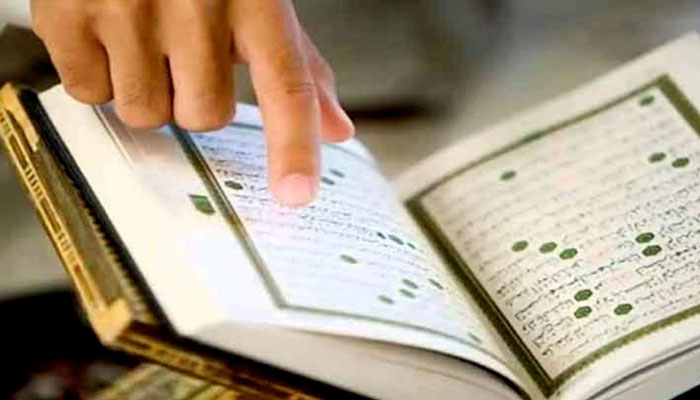Majority schools systems to make Holy Quran teaching compulsory
ISLAMABAD: The country’s major provinces, the federal capital territory, Azad Kashmir and Gilgit Baltistan, have included the compulsory teaching of nazrah Quran as part of their curriculum for the next academic year starting in August 2021. The federal government, Punjab, Khyber Pakhtunkhwa and AJK have already introduced the required legislation whereas Balochistan and Gilgit Baltistan have notified the implementation of the Single National Curriculum, that includes the mandatory teaching of the Holy Quran to students from grade 1-V.
In federal government educational institutions and in KP and Bahawalpur Division of Punjab, the compulsory teaching of the Holy Quran has also been introduced and will now be part of the Single National Curriculum, the first phase of which is being implemented from the next academic session.
Schools that are being run under the Pakistan Army, Airforce and Navy have also adopted the same SNC. In the case of all schools run by Pakistan Navy, teaching of the Holy Quran is already compulsory and the credit for that goes to the former naval chief Zafar Mehmood Abbasi.
Legislation at the federal level and in Punjab was introduced in the previous PMLN tenure in which the then state minister for education in Nawaz Sharif's cabinet, Balighur Rehman, played the pivotal role.
However, the then KP government of Pervez Khattak was the first one to introduce the compulsory teaching of the Holy Quran in its schools.
The present government has made the compulsory teaching of nazrah Quran part of the Single National Curriculum and developed a consensus among all provinces and regions to adopt the SNC. Sindh, however, is still maintaining the position mentioned above.
Under the law, it will be mandatory to impart Quranic education to Muslim students from class I to XII in all schools, whether private or public. According to the law, all educational institutions must compulsorily teach the nazrah Quran in grades I to V and (b) the translation of the Holy Quran in grades VI to XII in such a manner that the entire Holy Quran is taught by grade XII.
Regarding the Urdu translation of the Holy Quran to be taught under this scheme, the education ministry and the Council of Islamic Ideology have already approved a version in consultation with different religious scholars and Ulema bodies that is acceptable to all.
Unlike Punjab, KP, Balochistan and other regions, Sindh, however, has neither enacted any legislation nor decided administratively to implement SNC in the province. Provincial Education Minister Saeed Ghani when approached by The News confirmed that the Sindh government has not taken any such decision.
Ghani said that he had told the federal government that education is a provincial subject, therefore, the federal government cannot implement its choice curriculum in the province. He explained that despite the constitutional position, the Sindh government is willing to compare its curriculum with the syllabus of other provinces to improve it.
Ghani was of the view that the compulsory teaching of the Quran is not part of the Single National Curriculum being launched by the federal government with the consultation of the provinces. However, official sources confirm that the teaching of nazrah Quran is part of the Single National Curriculum.
-
 Pete Davidson’s Girlfriend Elsie Hewitt Says 'everything Hurts' After Sudden Medical Emergency
Pete Davidson’s Girlfriend Elsie Hewitt Says 'everything Hurts' After Sudden Medical Emergency -
 Princess Beatrice 17 Holidays Per Year Exposed Amid Andrew Arrest
Princess Beatrice 17 Holidays Per Year Exposed Amid Andrew Arrest -
 Who Is 'Queen Of Woke'? UK First Female Civil Head
Who Is 'Queen Of Woke'? UK First Female Civil Head -
 Dwayne Johnson Confesses What Secretly Scares Him More Than Fame
Dwayne Johnson Confesses What Secretly Scares Him More Than Fame -
 Elizabeth Hurley's Son Damian Breaks Silence On Mom’s Romance With Billy Ray Cyrus
Elizabeth Hurley's Son Damian Breaks Silence On Mom’s Romance With Billy Ray Cyrus -
 Shamed Andrew Should Be Happy ‘he Is Only In For Sharing Information’
Shamed Andrew Should Be Happy ‘he Is Only In For Sharing Information’ -
 Daniel Radcliffe Wants Son To See Him As Just Dad, Not Harry Potter
Daniel Radcliffe Wants Son To See Him As Just Dad, Not Harry Potter -
 Apple Sued Over 'child Sexual Abuse' Material Stored Or Shared On ICloud
Apple Sued Over 'child Sexual Abuse' Material Stored Or Shared On ICloud -
 Nancy Guthrie Kidnapped With 'blessings' Of Drug Cartels
Nancy Guthrie Kidnapped With 'blessings' Of Drug Cartels -
 Hailey Bieber Reveals Justin Bieber's Hit Song Baby Jack Is Already Singing
Hailey Bieber Reveals Justin Bieber's Hit Song Baby Jack Is Already Singing -
 Emily Ratajkowski Appears To Confirm Romance With Dua Lipa's Ex Romain Gavras
Emily Ratajkowski Appears To Confirm Romance With Dua Lipa's Ex Romain Gavras -
 Leighton Meester Breaks Silence On Viral Ariana Grande Interaction On Critics Choice Awards
Leighton Meester Breaks Silence On Viral Ariana Grande Interaction On Critics Choice Awards -
 Heavy Snowfall Disrupts Operations At Germany's Largest Airport
Heavy Snowfall Disrupts Operations At Germany's Largest Airport -
 Andrew Mountbatten Windsor Released Hours After Police Arrest
Andrew Mountbatten Windsor Released Hours After Police Arrest -
 Heidi Klum Eyes Spooky Season Anthem With Diplo After Being Dubbed 'Queen Of Halloween'
Heidi Klum Eyes Spooky Season Anthem With Diplo After Being Dubbed 'Queen Of Halloween' -
 King Charles Is In ‘unchartered Waters’ As Andrew Takes Family Down
King Charles Is In ‘unchartered Waters’ As Andrew Takes Family Down




